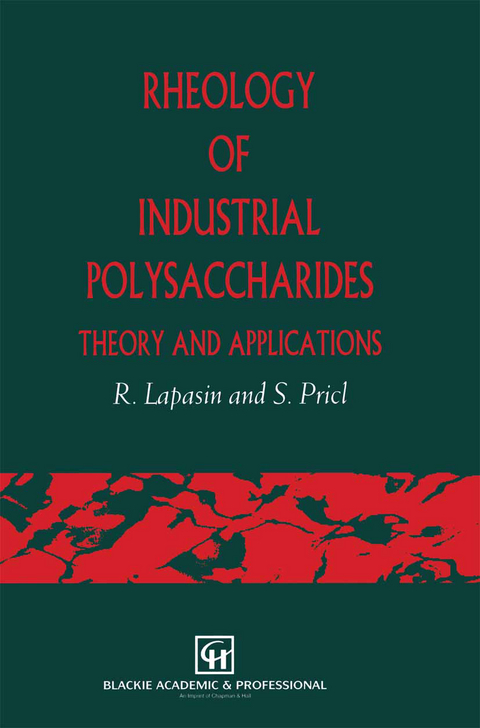
Rheology of Industrial Polysaccharides: Theory and Applications
Seiten
2012
|
Softcover reprint of the original 1st ed. 1995
Springer-Verlag New York Inc.
978-1-4613-5915-9 (ISBN)
Springer-Verlag New York Inc.
978-1-4613-5915-9 (ISBN)
fudustrial uses of polysaccharides centre on their ability to thicken or structure many times their own weight of water, or in other words to control the rheology of hydrated systems. A definitive text giving a rigorous description of the rheological approaches relevant to polysaccharide systems is therefore appropriate and timely.
fudustrial uses of polysaccharides centre on their ability to thicken or structure many times their own weight of water, or in other words to control the rheology of hydrated systems. Until comparatively recently, however, objective characterisation of polysaccharide rheology, except in a few specialist research laboratories, was largely confined to compression of gels, simple measurements of solution viscosity, often in ill-defined geometries, and imitative tests intended to reflectproductperformance in specific areas ofend-use. Several factors have combined to bring a wider range of rheological techniques into common use. One is the increasing practical importance of systems that cannot adequately be described as solids or liquids, such as 'weak gels' and spreadable pastes. fu parallel, routine characterisation of such systems has become economically feasible with the development of a new generation of comparatively inexpensive computer-controlled instruments. There has also been a change ofemphasis from phenomenologicaldescription ofproduct texture towards the use of rheological measurements to probe the underlying molecular and supramolecular structures and the processes by which they are formed. As a result, even the most pragmatic producers and users of industrial polysaccharides are probably now familiar with terms such as creep compliance, stress overshoot and the ubiquitous G' and G", although perhaps not fully understanding their precise meaning or practical significance. A definitive text giving a rigorous description of the rheological approaches relevant to polysaccharide systems is therefore appropriate and timely. Romano Lapasin and Sabrina Priel are to be congratulated for tackling the daunting but worthwhile taskofproducing such avolume.
fudustrial uses of polysaccharides centre on their ability to thicken or structure many times their own weight of water, or in other words to control the rheology of hydrated systems. Until comparatively recently, however, objective characterisation of polysaccharide rheology, except in a few specialist research laboratories, was largely confined to compression of gels, simple measurements of solution viscosity, often in ill-defined geometries, and imitative tests intended to reflectproductperformance in specific areas ofend-use. Several factors have combined to bring a wider range of rheological techniques into common use. One is the increasing practical importance of systems that cannot adequately be described as solids or liquids, such as 'weak gels' and spreadable pastes. fu parallel, routine characterisation of such systems has become economically feasible with the development of a new generation of comparatively inexpensive computer-controlled instruments. There has also been a change ofemphasis from phenomenologicaldescription ofproduct texture towards the use of rheological measurements to probe the underlying molecular and supramolecular structures and the processes by which they are formed. As a result, even the most pragmatic producers and users of industrial polysaccharides are probably now familiar with terms such as creep compliance, stress overshoot and the ubiquitous G' and G", although perhaps not fully understanding their precise meaning or practical significance. A definitive text giving a rigorous description of the rheological approaches relevant to polysaccharide systems is therefore appropriate and timely. Romano Lapasin and Sabrina Priel are to be congratulated for tackling the daunting but worthwhile taskofproducing such avolume.
1 The polysaccharides: sources and structures.- 2 Industrial applications of polysaccharides.- 3 Rheology.- 4 Rheology of polysaccharide systems.- 5 Rheometry.- Appendix A: review of elementary matrix, vector and tensor algebra.- Appendix B: derivation of the rate of deformation tensor.- Appendix C: the Criminale-Ericksen-Filbey (or CEF) equation.- Appendix D: correlation between relaxation modulus and material functions.
| Zusatzinfo | XIV, 620 p. |
|---|---|
| Verlagsort | New York, NY |
| Sprache | englisch |
| Maße | 155 x 235 mm |
| Themenwelt | Mathematik / Informatik ► Mathematik ► Wahrscheinlichkeit / Kombinatorik |
| Technik ► Lebensmitteltechnologie | |
| Technik ► Maschinenbau | |
| ISBN-10 | 1-4613-5915-5 / 1461359155 |
| ISBN-13 | 978-1-4613-5915-9 / 9781461359159 |
| Zustand | Neuware |
| Haben Sie eine Frage zum Produkt? |
Mehr entdecken
aus dem Bereich
aus dem Bereich
Eine Einführung in die faszinierende Welt des Zufalls
Buch | Softcover (2024)
Springer Spektrum (Verlag)
CHF 55,95
Buch | Softcover (2024)
Springer Spektrum (Verlag)
CHF 62,95


